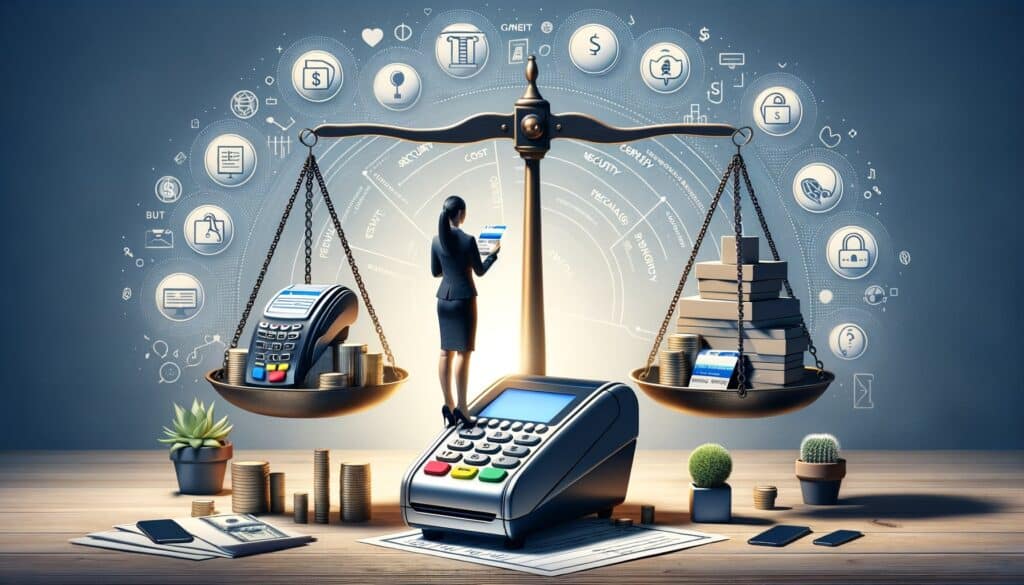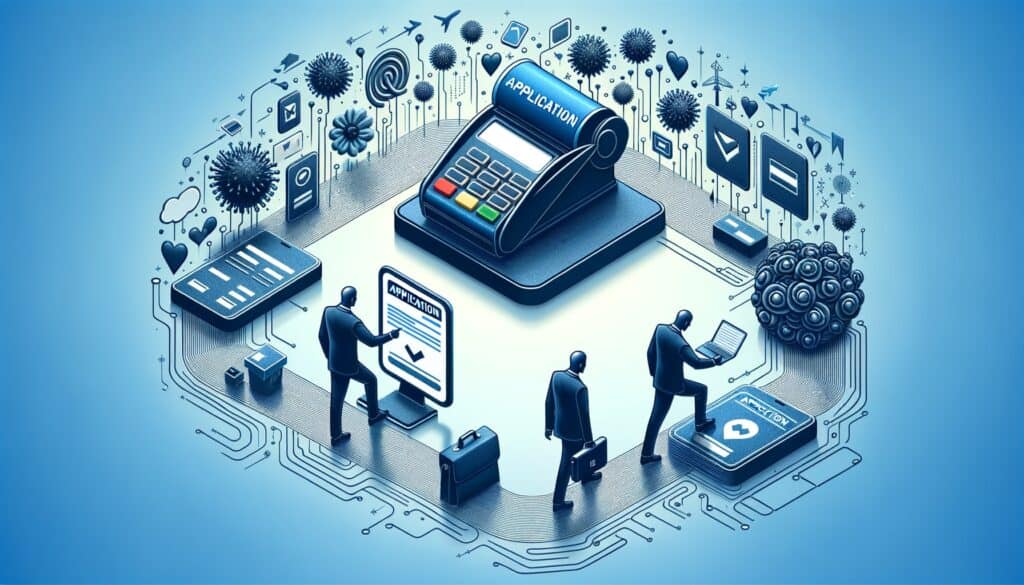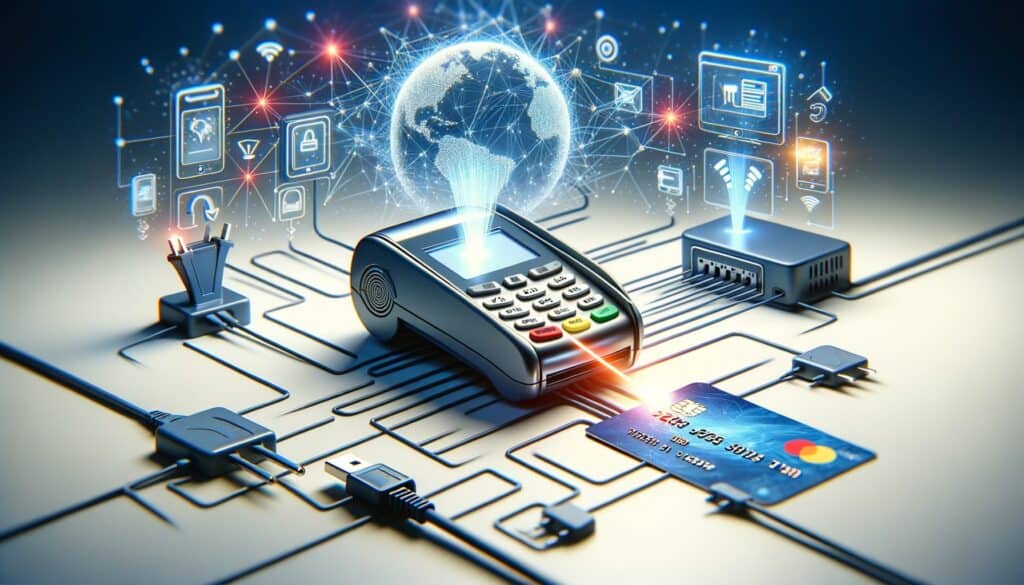
By Barbara Thomas November 28, 2024
In today’s digital age, credit card machines have become an essential tool for small businesses. Gone are the days when cash was the primary mode of payment. With the rise of e-commerce and the convenience of card payments, having a credit card machine is crucial for any small business looking to thrive in the competitive market.
This article will guide you through the process of obtaining a credit card machine for your small business, covering everything from choosing the right option to troubleshooting common issues.
Choosing the Right Option for Your Small Business
When it comes to credit card machines, there are several options available in the market. Understanding the different types and their features will help you make an informed decision for your small business. The most common types of credit card machines include traditional countertop terminals, mobile card readers, and virtual terminals.
Traditional Countertop Terminals: These are the classic credit card machines you often see at the checkout counters of retail stores. They are connected to a phone line or internet connection and allow customers to swipe or insert their cards for payment. Traditional terminals are reliable and offer a range of features such as receipt printing and contactless payment options.
Mobile Card Readers: With the increasing popularity of smartphones and tablets, mobile card readers have gained significant traction among small businesses. These devices can be attached to your mobile device, turning it into a portable credit card machine. Mobile card readers are ideal for businesses that operate on-the-go, such as food trucks or pop-up shops.
Virtual Terminals: Virtual terminals are software-based solutions that allow businesses to process credit card payments through a computer or laptop. They are particularly useful for e-commerce businesses or those that primarily operate online. Virtual terminals eliminate the need for physical card readers and can securely process payments from anywhere with an internet connection.
Factors to Consider Before Getting a Credit Card Machine for Your Small Business

Before diving into the process of obtaining a credit card machine, there are several factors you should consider to ensure you make the right choice for your small business. These factors include the cost of the machine, compatibility with your existing systems, customer support, and the reputation of the provider.
Cost: Credit card machines come with various costs, including upfront fees, monthly fees, and transaction fees. It’s essential to evaluate your budget and choose a machine that aligns with your financial capabilities. Consider the long-term costs and benefits to make an informed decision.
Compatibility: Ensure that the credit card machine you choose is compatible with your existing point-of-sale (POS) system or software. Integration issues can lead to inefficiencies and delays in processing payments, which can negatively impact your business operations.
Customer Support: Look for a credit card machine provider that offers reliable customer support. In case of any technical issues or questions, having access to prompt assistance can save you time and frustration. Read reviews and testimonials to gauge the quality of customer support provided by different providers.
Provider Reputation: Research the reputation of the credit card machine provider before making a decision. Look for providers with a proven track record of reliability, security, and excellent customer service. Check online reviews and ask for recommendations from other small business owners in your network.
How to Apply for a Credit Card Machine: Step-by-Step Guide

Once you have determined the type of credit card machine that suits your small business and considered the necessary factors, it’s time to apply for a credit card machine. The application process may vary depending on the provider, but the following steps will give you a general idea of what to expect:
Research Providers: Start by researching different credit card machine providers. Compare their offerings, fees, and customer reviews to find the best fit for your small business.
Gather Required Documents: Most providers will require certain documents to process your application. These may include your business license, tax identification number, bank statements, and proof of address. Gather these documents in advance to expedite the application process.
Fill Out the Application: Once you have chosen a provider, fill out the application form provided by the company. Provide accurate and detailed information to avoid any delays or complications.
Wait for Approval: After submitting your application, the provider will review it and assess your eligibility. This process may take a few days to a couple of weeks, depending on the provider’s internal procedures.
Sign the Agreement: If your application is approved, you will receive an agreement outlining the terms and conditions of the credit card machine service. Carefully review the agreement and sign it if you agree to the terms.
Receive and Set Up the Machine: Once the agreement is signed, the provider will ship the credit card machine to your business address. Follow the instructions provided to set up the machine and connect it to your existing systems.
Setting Up Your Credit Card Machine: Installation and Configuration Process

After receiving your credit card machine, it’s time to set it up and configure it to start accepting payments. The specific steps may vary depending on the type of machine you have chosen, but the following general guidelines will help you through the process:
Unbox and Inspect: Carefully unbox the credit card machine and inspect it for any physical damage. Report any issues to the provider immediately to ensure a prompt resolution.
Connect to Power: Plug in the power cord of the credit card machine and connect it to a power source. Ensure that the power supply is stable and reliable to avoid any disruptions during transactions.
Connect to the Internet: If your credit card machine requires an internet connection, follow the instructions provided to connect it to your Wi-Fi network or Ethernet cable. Test the connection to ensure it is stable and secure.
Configure Settings: Access the settings menu of the credit card machine and configure it according to your business requirements. Set the language, time zone, receipt preferences, and any other relevant settings.
Test Transactions: Perform a few test transactions to ensure that the credit card machine is functioning correctly. Use test cards or small amounts to avoid any actual charges during the testing phase.
Understanding Credit Card Processing Fees: What to Expect as a Small Business Owner

When accepting credit card payments, small business owners need to be aware of the various fees associated with credit card processing. These fees can significantly impact your bottom line, so it’s crucial to understand them and factor them into your pricing strategy. The most common credit card processing fees include interchange fees, assessment fees, and markup fees.
Interchange Fees: Interchange fees are charged by the card networks (Visa, Mastercard, etc.) and are a percentage of the transaction amount. These fees vary depending on factors such as the type of card used (debit, credit, rewards), the industry, and the transaction method (swipe, chip, contactless). Interchange fees are non-negotiable and are typically passed on to the merchant by the credit card machine provider.
Assessment Fees: Assessment fees are charged by the card networks and are a fixed percentage of the transaction amount. These fees are set by the card networks and are also non-negotiable. They contribute to the overall cost of processing credit card payments.
Markup Fees: Markup fees are the fees charged by the credit card machine provider or payment processor. These fees are negotiable and can vary significantly between providers. Markup fees may include monthly fees, transaction fees, statement fees, and other miscellaneous charges. It’s essential to carefully review the fee structure provided by the provider and negotiate where possible to minimize costs.
Ensuring Security and Compliance: Best Practices for Credit Card Machine Usage
As a small business owner, ensuring the security and compliance of your credit card machine usage is of utmost importance. Failure to adhere to security standards can result in data breaches, financial losses, and damage to your reputation. Follow these best practices to protect your business and your customers’ sensitive information:
PCI DSS Compliance: The Payment Card Industry Data Security Standard (PCI DSS) is a set of security standards that all businesses accepting credit card payments must adhere to. Ensure that your credit card machine and payment processing systems are PCI DSS compliant. This includes regularly updating software, using secure networks, and encrypting cardholder data.
Secure Network Connections: Use secure internet connections, such as encrypted Wi-Fi or wired connections, to protect the transmission of cardholder data. Avoid using public or unsecured networks for credit card transactions.
Employee Training: Train your employees on best practices for credit card machine usage and security. Educate them on how to identify and report suspicious activities, such as potential fraud attempts or tampering with the credit card machine.
Regular Software Updates: Keep your credit card machine’s software up to date to ensure you have the latest security patches and features. Regularly check for updates provided by the manufacturer or your credit card machine provider.
Secure Storage of Cardholder Data: If you store cardholder data for recurring payments or future transactions, ensure that it is securely stored and encrypted. Implement strict access controls and limit the number of employees who have access to sensitive data.
Troubleshooting Common Issues with Credit Card Machines: Tips and Solutions
Despite their reliability, credit card machines can sometimes encounter issues that can disrupt your business operations. Being prepared to troubleshoot common issues can save you time and frustration. Here are some tips and solutions for common credit card machine problems:
Connectivity Issues: If your credit card machine is experiencing connectivity issues, check your internet connection first. Ensure that your Wi-Fi or Ethernet connection is stable and functioning correctly. If the issue persists, contact your internet service provider for assistance.
Card Reading Errors: If your credit card machine is having trouble reading cards, ensure that the card is inserted or swiped correctly. Clean the card reader with a soft cloth to remove any dirt or debris that may be obstructing the reading process. If the problem persists, contact your credit card machine provider for further assistance.
Printer Problems: If your credit card machine has a built-in printer and is experiencing printing issues, check the paper roll to ensure it is properly loaded. Replace the paper roll if necessary. If the printer is still not functioning correctly, contact your credit card machine provider for troubleshooting steps or to request a replacement.
Error Messages: Error messages on your credit card machine can indicate various issues. Consult the user manual or contact your credit card machine provider for specific troubleshooting steps related to the error message you are encountering.
Frequently Asked Questions (FAQs)
Q1. What are the advantages of accepting credit card payments for small businesses?
Accepting credit card payments offers several advantages for small businesses, including increased sales, improved cash flow, enhanced customer convenience, and reduced risk of handling cash.
Q2. Can I use my personal credit card machine for my small business?
While it may be tempting to use a personal credit card machine for your small business, it is generally not recommended. Personal credit card machines may not have the necessary features or security measures required for business transactions. It’s best to invest in a credit card machine specifically designed for small business use.
Q3. Can I negotiate credit card processing fees?
While interchange and assessment fees are non-negotiable, markup fees charged by credit card machine providers or payment processors can often be negotiated. It’s worth discussing the fee structure with different providers and leveraging competitive offers to secure the best rates for your small business.
Q4. How long does it take to receive a credit card machine after applying?
The time it takes to receive a credit card machine after applying can vary depending on the provider and the complexity of your application. It can range from a few days to a couple of weeks. It’s advisable to inquire about the estimated delivery time during the application process.
Conclusion
Obtaining a credit card machine for your small business is a crucial step towards embracing the digital payment revolution and staying competitive in today’s market. By understanding the different types of credit card machines, considering the necessary factors, and following the step-by-step guide for application and setup, you can seamlessly integrate this essential tool into your business operations.
Remember to prioritize security and compliance, troubleshoot common issues, and negotiate fees to ensure a smooth and cost-effective credit card machine experience. With the right credit card machine in place, you can provide your customers with a convenient and secure payment option while driving growth and success for your small business.